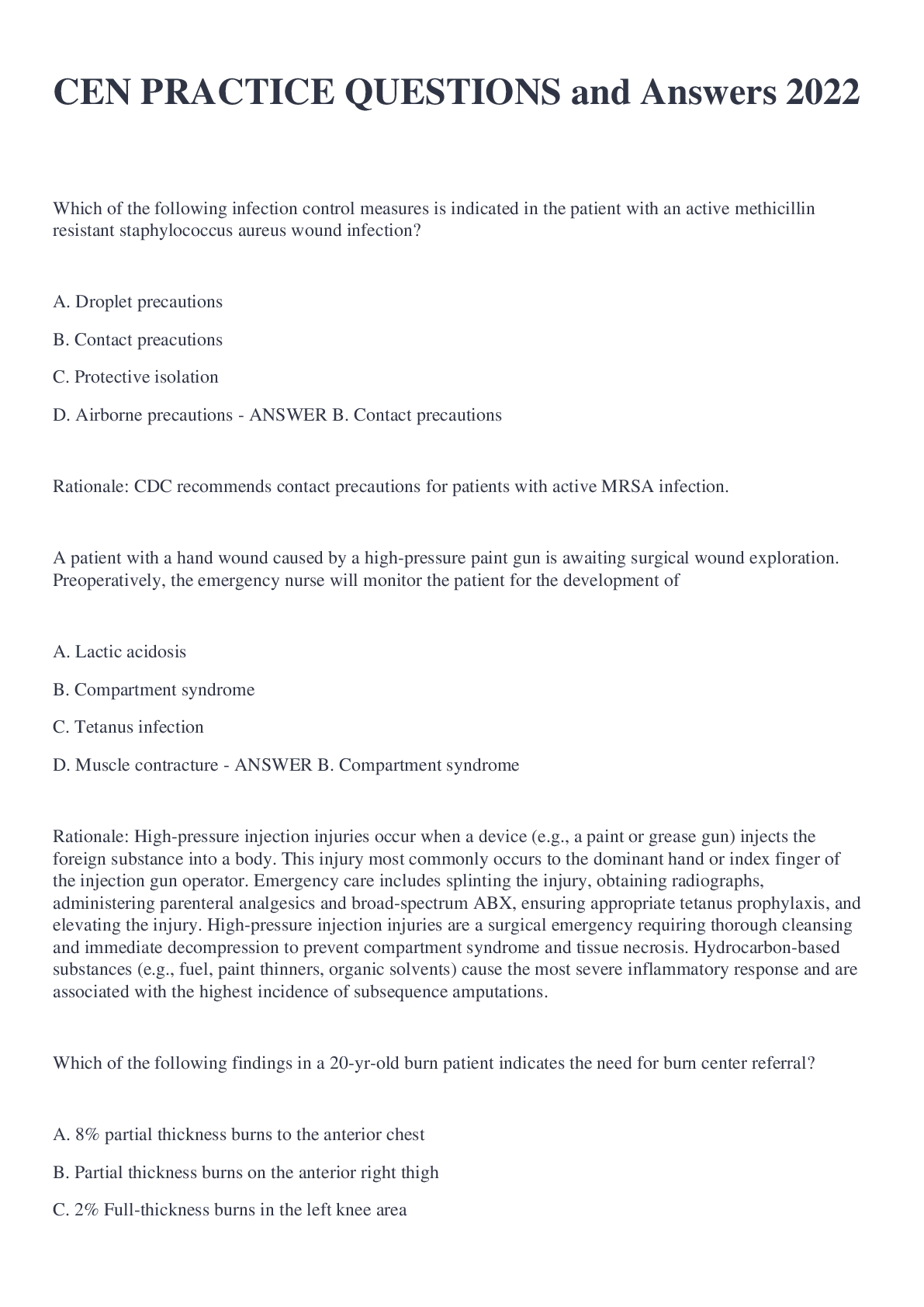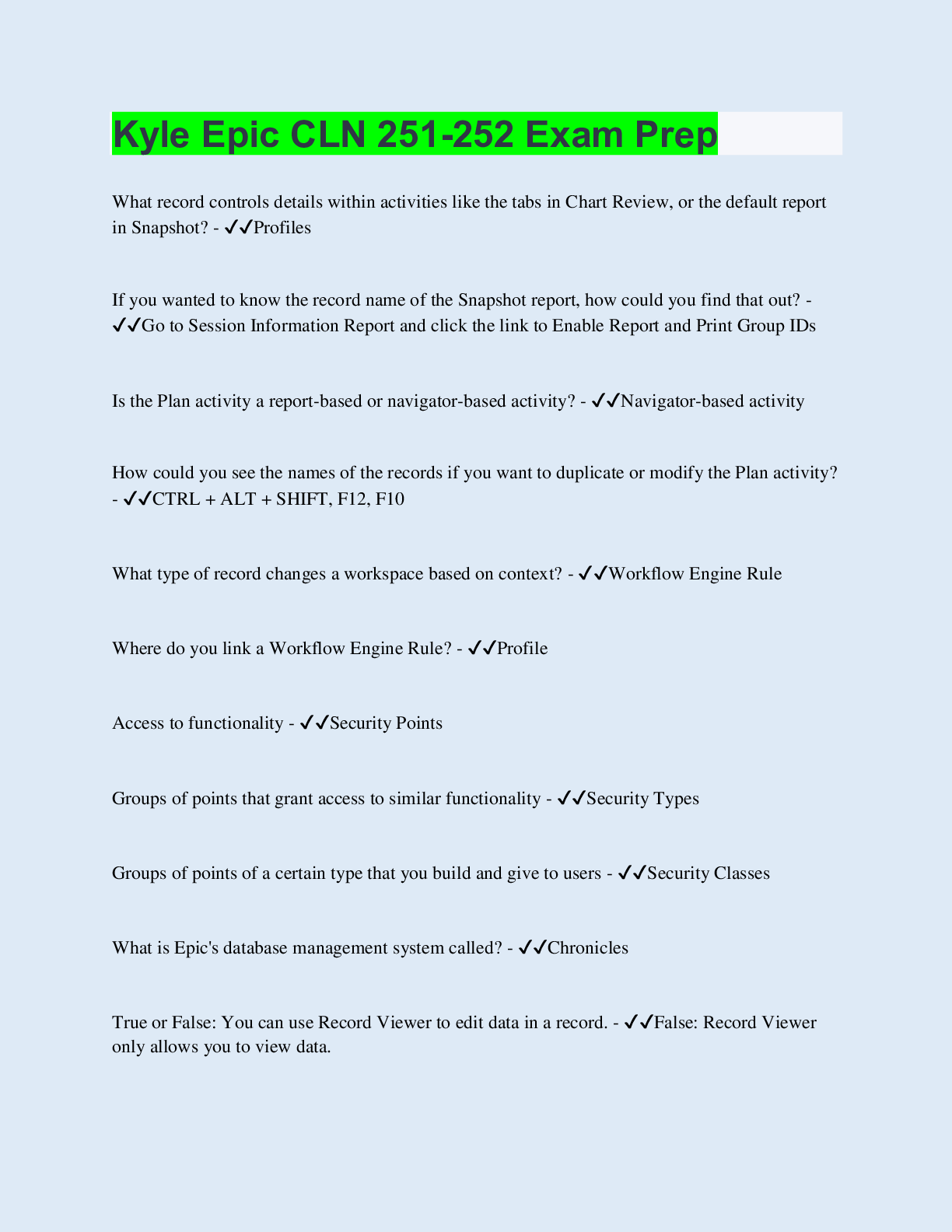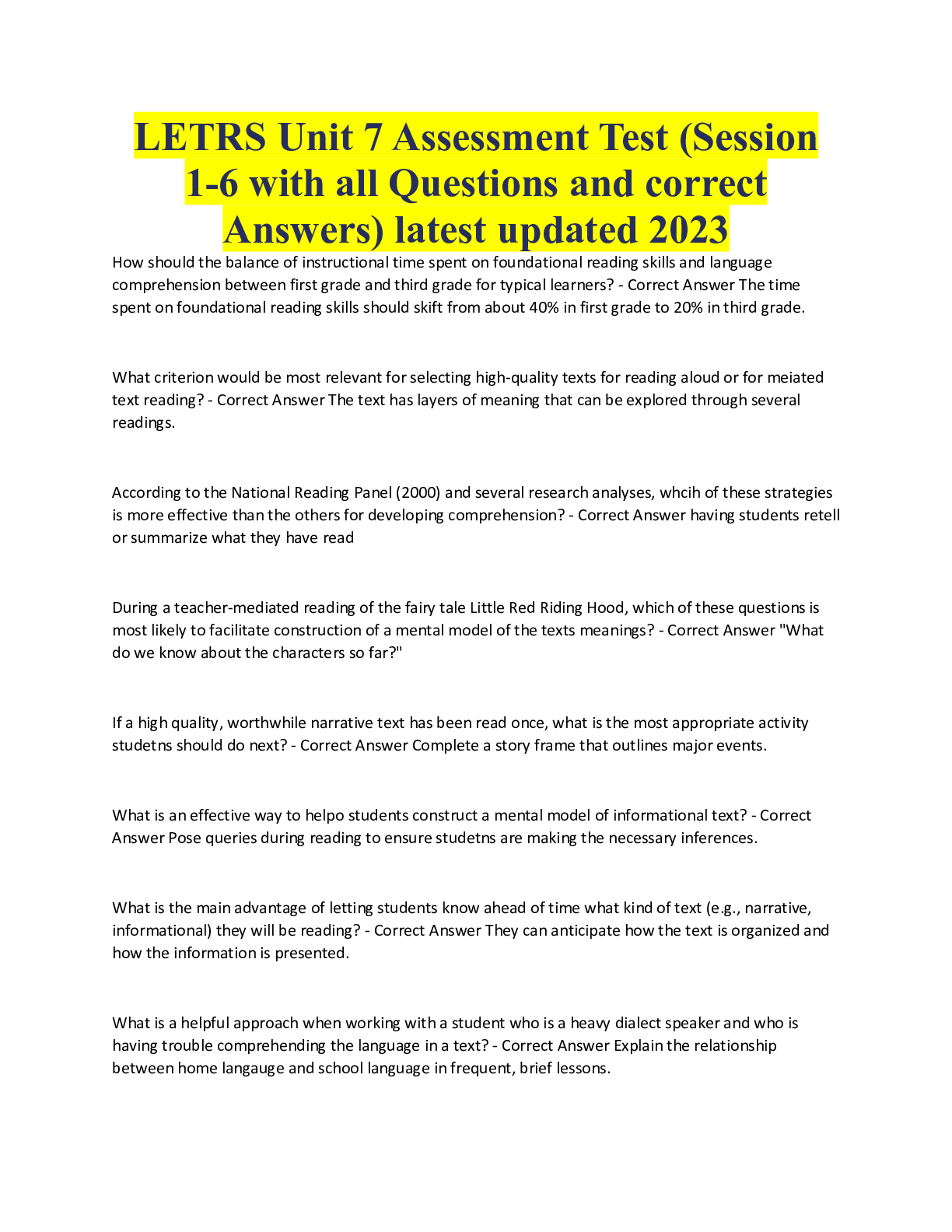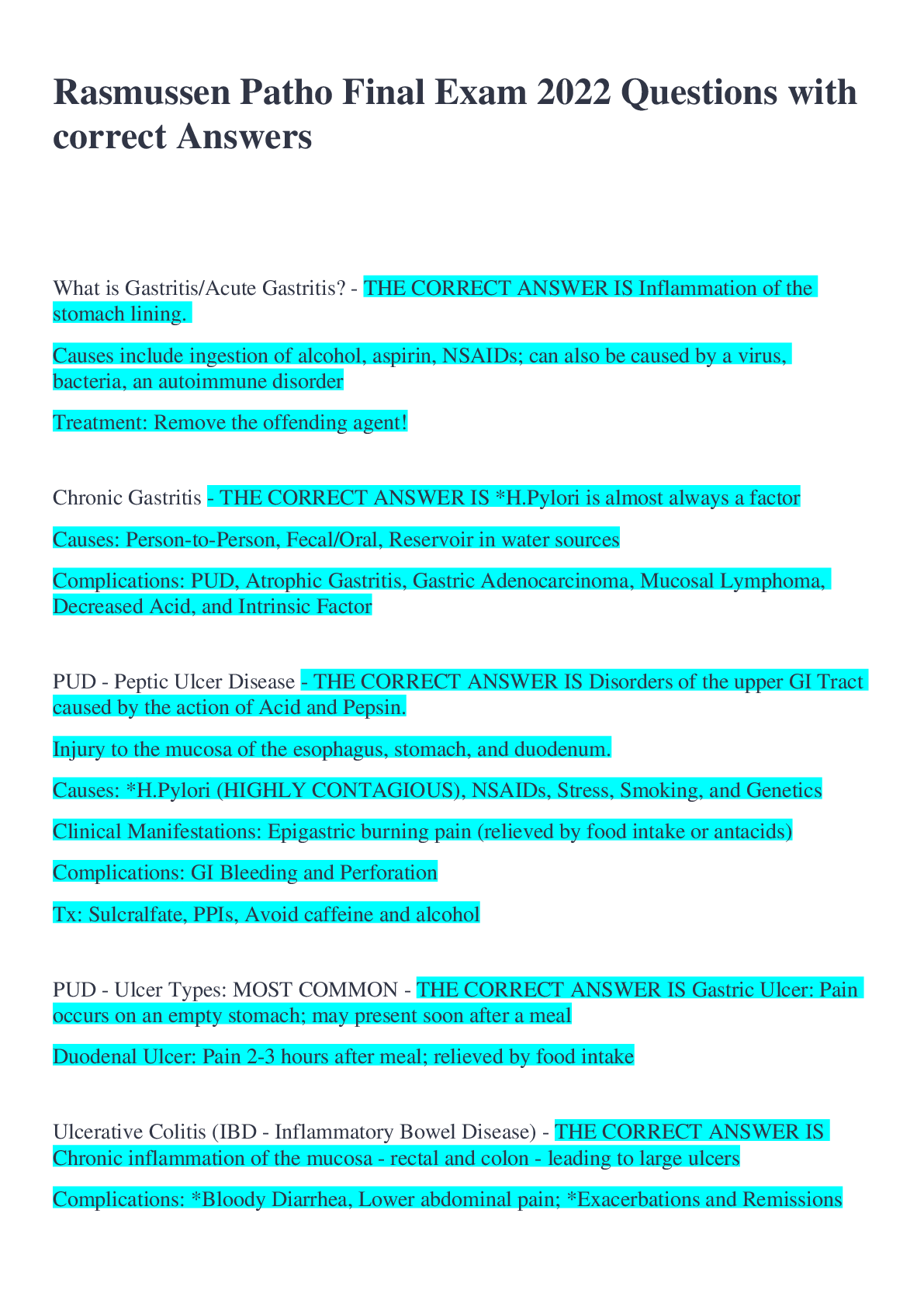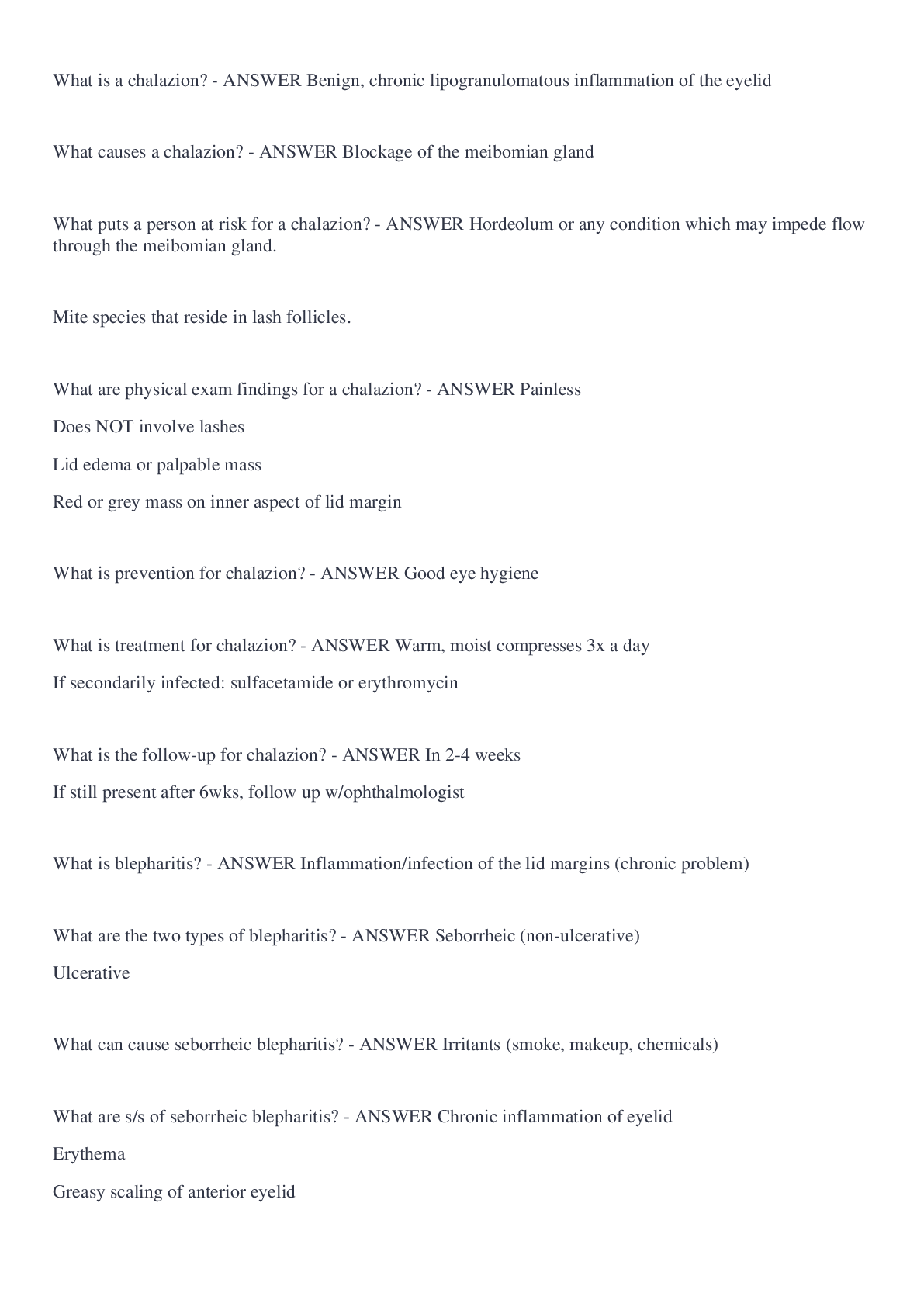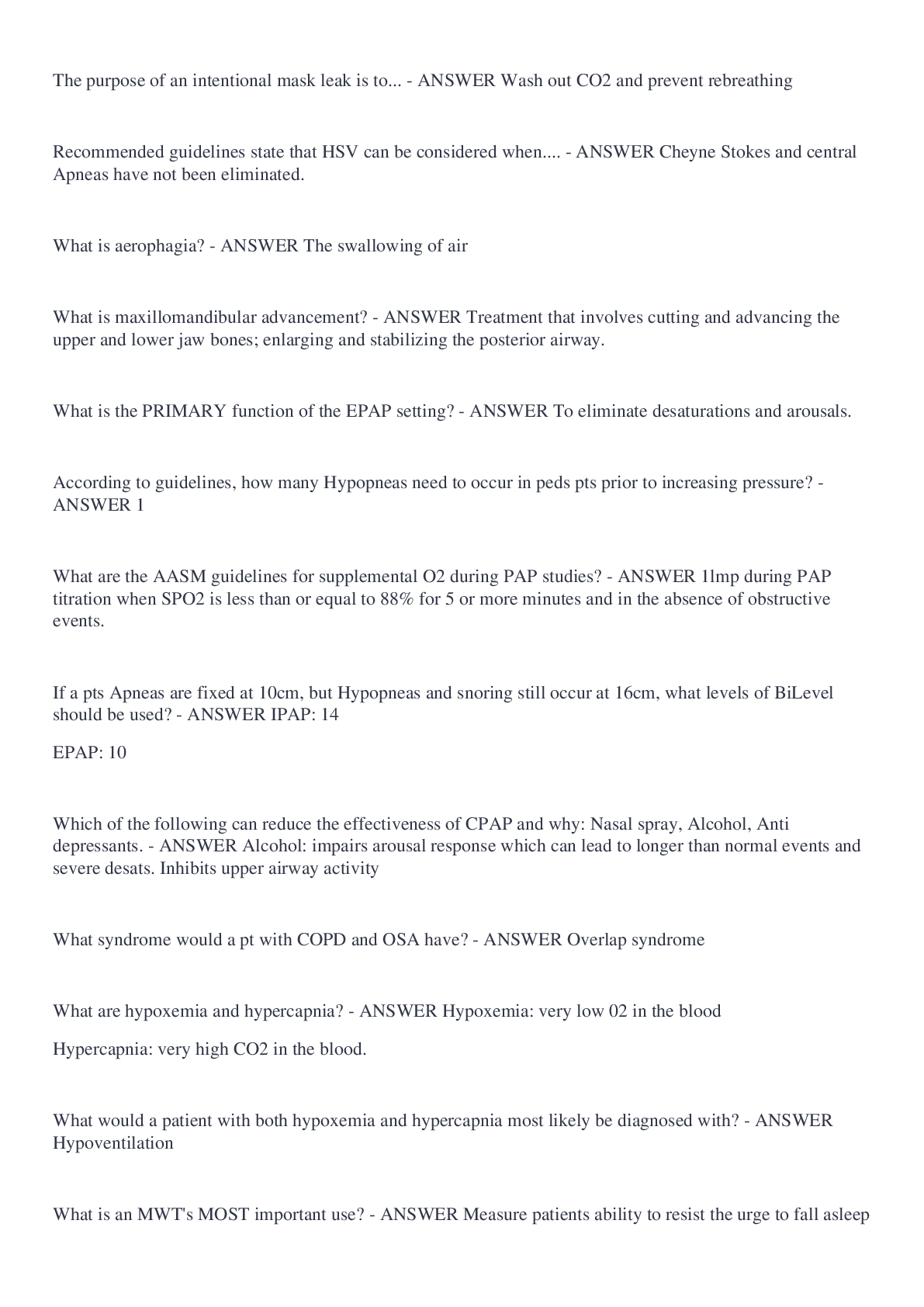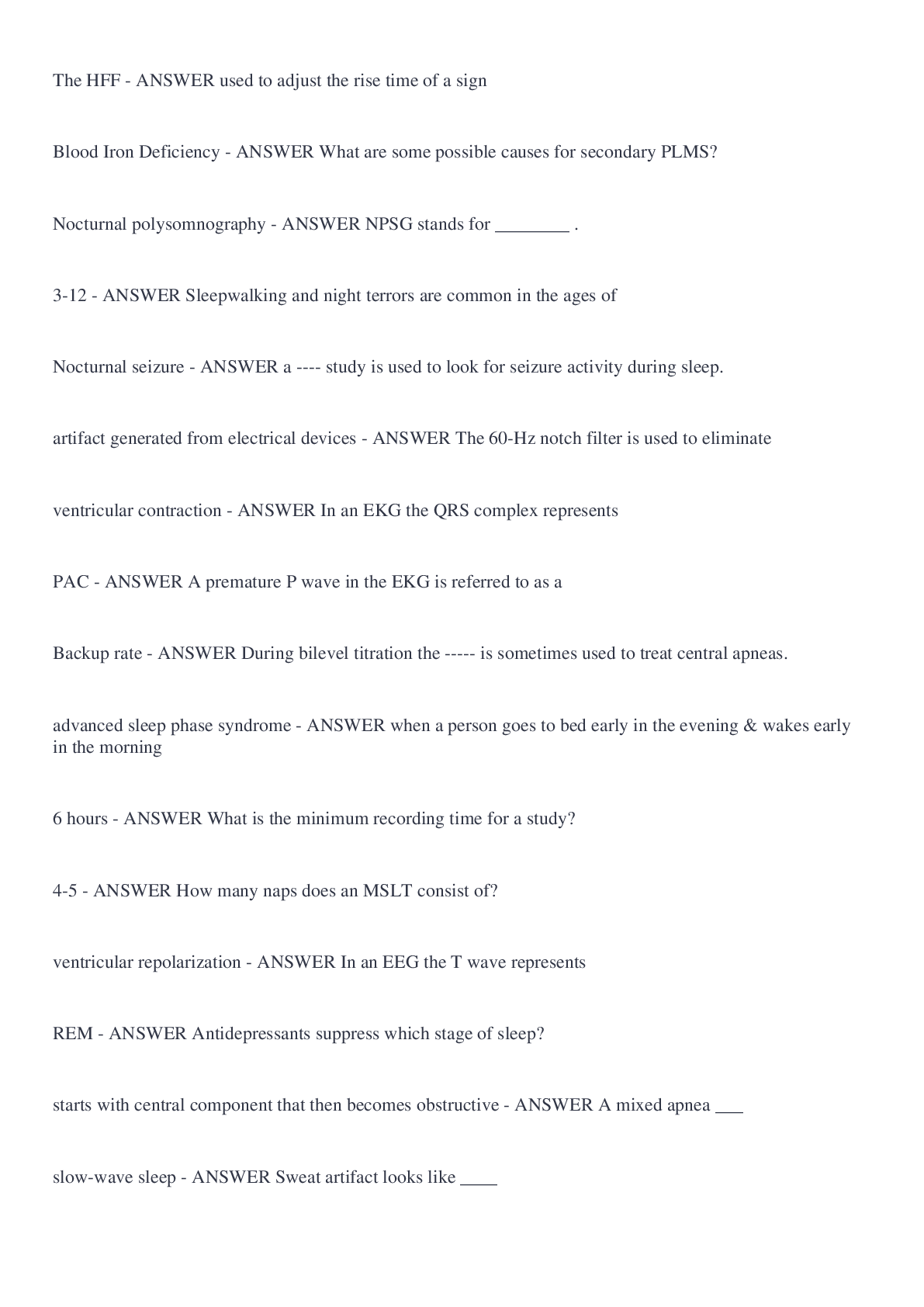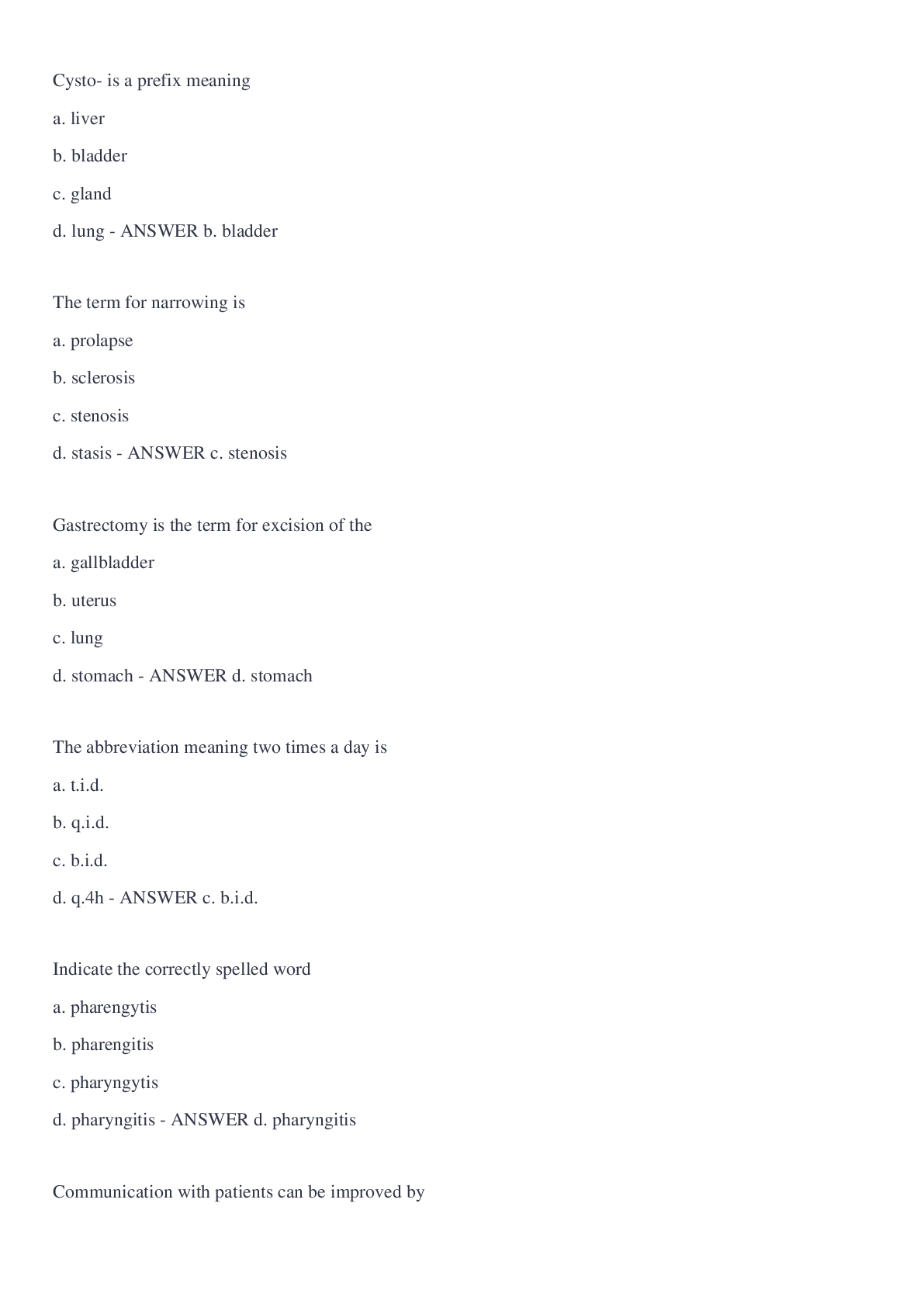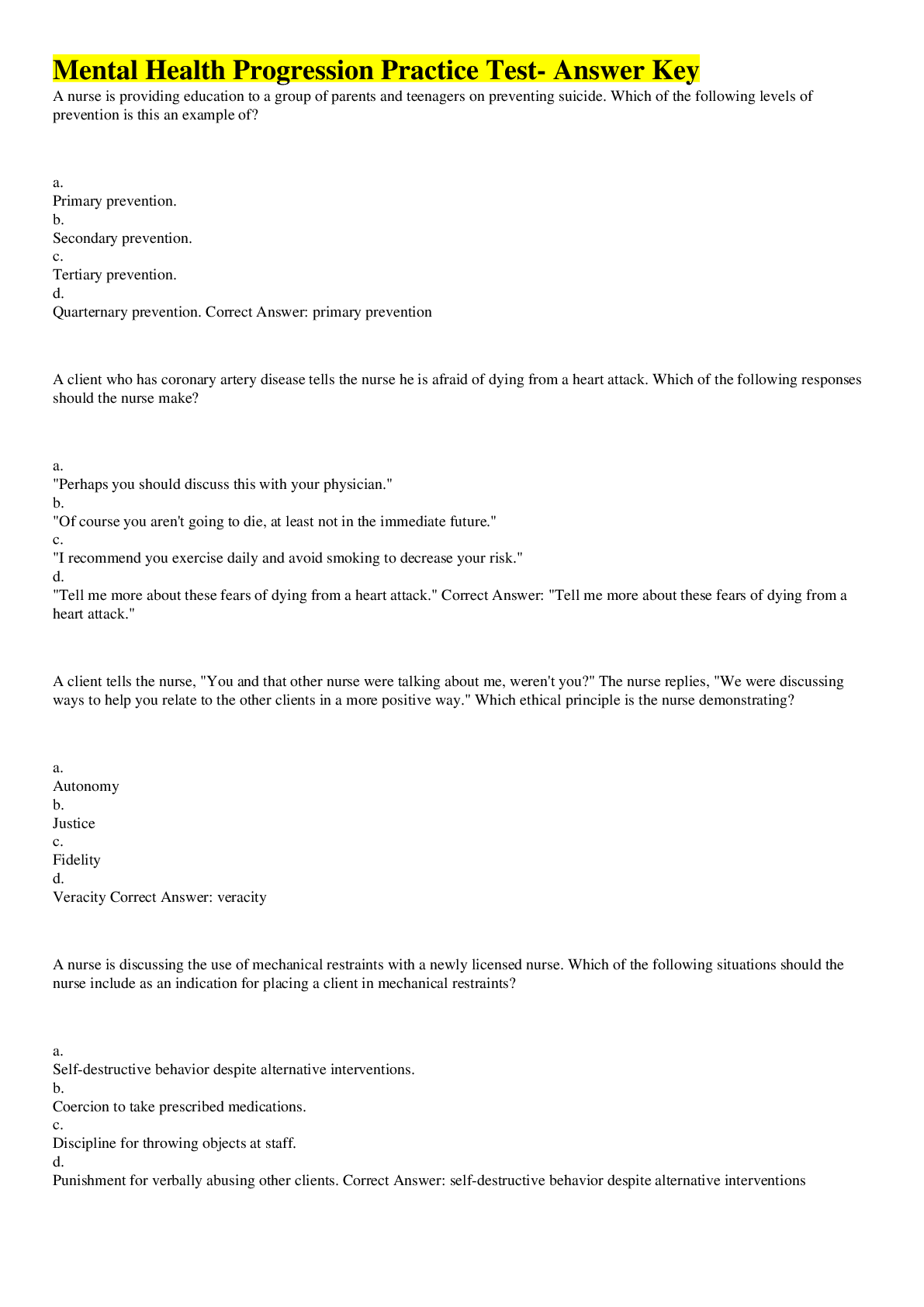Health Care > EXAM > Mental Health Progression Practice Test- Answer Key (All)
Mental Health Progression Practice Test- Answer Key
Document Content and Description Below
Mental Health Progression Practice 1.A nurse is caring for a client who is dying. The client says, "My mother died in the hospital, but I did not get there before she died." Which of the following s t... atements should the nurse make? A. "We will call your family in time for them to get here." Rationale: The nurse dismisses the client’s concerns and gives false reassurance. B. "I wonder if you are fearful of dying alone." Rationale: The nurse dismisses the client’s concerns and gives false reassurance. C. "I will make sure a staff member is in your room at all times." Rationale: The nurse dismisses the client’s concerns and gives false reassurance. D. "I will tell your family of your concern so that they can be here." Rationale: The nurse dismisses the client’s concerns and gives false reassurance. 2.A nurse is caring for a young adult client who says he is experiencing increased anxiety and an inability to concentrate. Which of the following responses should the nurse make? A. "It sounds like you're having a difficult time." Rationale: This therapeutic response is an open-ended, empathetic statement that encourages the client to talk. B. "Have you talked to your parents about this yet?" Rationale: This nontherapeutic response is focused inappropriately on the client's parents. It does not address the client's need to communicate or express feelings. C. "Why do you think you are so anxious?" Rationale: This nontherapeutic response can make the client feel defensive, and he might not be able to tell the nurse why. D. "How long has this been going on?" Rationale: This nontherapeutic response is a closed-ended statement that does not encourage the client to talk. 3.A nurse is admitting a client who is in the manic phase of bipolar disorder. The nurse should plan to make which of the following room assignments for the client? A. A private room in a quiet location on the unit Rationale:A private room in a quiet location is ideal for a client with mania. The client may easily become overstimulated by the number of people and activities in a nursing care unit. A private room can Created on:02/05/2018 Page 1 Detailed Answer Key Mental Health Progression Practice be used for time-out during the day and to settle down to sleep at night. B. A semi-private room with a roommate who has a similar diagnosis Rationale: The client should not be given a semi-private room with a roommate who is also experiencing mania because the situation would be too stimulating for each of them. C. A private room close to the nursing station Rationale: The client should not be given a private room close to the nursing station because of the high level of activity in that area. D. A seclusion room until the client’s activity level becomes more subdued. Rationale:Legal and ethical guidelines require treatment in the least restrictive setting. Seclusion requires a provider’s s order and can only be used when there is a specific, documented need to do so. 4.A nurse is admitting a client who has experienced a weight loss of 11 kg (25 lb) in the past 3 months. The client weighs 40 kg (88 lb) and believes she is fat. Which of the following aspects of care should the nurse consider the first priority for this client? A. Identify the client's nutritional status. Rationale:According to the nursing process, the nurse should perform an assessment first to gather enough data regarding nutritional status and other findings in order to plan, implement, and evaluate care. The assessment identifies client nutrition needs as well as complications the client might be experiencing related to the eating disorder. B. Request a mental health consult. Rationale: Requesting a mental health consult might be necessary but another aspect of care is the priority. C. Plan a therapeutic diet for the client. Rationale: Rationale C. Planning a therapeutic diet for the client will be necessary but another aspect of care is the priority. D. Provide a structured environment for the client. Rationale:It is important to provide a structured environment for the client regarding meals, times for weighing, and monitoring of eating, but another aspect of care is the priority. 5.A nurse is caring for a client who has severe manifestations of schizophrenia and is medicated PRN for agitation with haloperidol. The nurse should assess the client for which of the following adverse effects? A. Dysrhythmias Rationale: Cardiac dysrhythmias are a risk for clients taking haloperidol and other conventional antipsychotic medications. The client should be monitored for changes in vital signs, tachycardia, and ECG changes, including prolonged QT interval, while taking haloperidol. There Created on:02/05/2018 Page 2 Detailed Answer Key Mental Health Progression Practice is a risk for cardiac arrest due to torsades de pointes. B. Cataracts Rationale: The client who takes haloperidol is at risk for glaucoma, but cataracts are not an adverse effect. C. Pancreatitis Rationale: The client who takes haloperidol is at risk for hepatitis, but pancreatitis is not an adverse effect. D. Bleeding Rationale: The client who takes haloperidol does not have an increased risk for bleeding. 6.A client becomes very dejected and states, "No one really cares what happens to me. Life isn't worth living anymore." Which of the following responses should the nurse make? A. "Of course people care. Your family comes to visit every day." Rationale: Trying to convince the client that his family members care about him is false reassurance that minimizes the feelings he just communicated. B. "Why do you feel that way?" Rationale:Asking the client a "why" question minimizes his feelings and is nontherapeutic. C. "Tell me who you think doesn't care about you." Rationale:By asking the client to tell what people don't care about him, the nurse is challenging the client's beliefs and changing the focus of the client away from his feelings and onto another subject. D. "I care about you, and I am concerned that you feel so sad." Rationale: This is an open-ended therapeutic statement that focuses on the client's feelings, shows empathy, and allows for further exploration of the client's belief that life is not worth living in order to keep the client safe from suicidal thoughts. 7.A nurse on a mental health unit is caring for a client who has generalized anxiety disorder. The client received a telephone call that was upsetting, and now the client is pacing up and down the corridors of the unit. Which of the following actions should the nurse take? A. Instruct the client to sit down and stop pacing. Rationale: The client is experiencing severe or panic-level anxiety and in this condition has difficulty comprehending instructions. B. Allow the client to pace alone until physically tired. Rationale: Not intervening for the client's pacing and allowing it to continue could be a safety hazard for the client and other clients in the area. The nurse should take measures to reduce the client's anxiety. Created on:02/05/2018 Page 3 Detailed Answer Key Mental Health Progression Practice C. Have a staff member escort the client to her room. Rationale: The client is experiencing severe or panic-level anxiety and should not be left alone to rest. D. Walk with the client at a gradually slower pace. Rationale: When the client is experiencing increased anxiety, it is important for the nurse to remain with the client and promote a calm atmosphere. By walking with the client at a gradually slowing pace, the nurse provides gross motor activity as an anxiety outlet that helps to calm the client and demonstrates therapeutic offering of self. 8.A nurse is caring for a client who was involved in heavy combat and observed war casualties. The nurse should suspect that the client is suffering from posttraumatic stress disorder (PTSD) if the client makes which of the following statements? A. "I check any room I enter because the enemy is still after me and could be hiding anywhere." Rationale: This client is making a paranoid statement, something more typical of a client who has persecutory delusions. This statement is not characteristic of a client who has PTSD. B. "My child was born with a birth defect due to an exposure I had overseas." Rationale: This statement is not characteristic of a client who has PTSD. C. "I killed four enemy soldiers with my bare hands and saved my entire battalion." Rationale: This client is making a grandiose statement, something more typical of a client who has bipolar disorder in the manic phase. This statement is not characteristic of a client who has PTSD. D. "In my dreams, all I can see are the wounded reaching out and trying to grab me." Rationale: Many clients who have PTSD repeatedly re-experience the ordeal in the form of flashback episodes, memories, nightmares, or frightening thoughts, especially when they are exposed to events or objects reminiscent of the trauma. This client's statement about haunting dreams is typical of a client who has PTSD. 9.A school nurse is talking with a 13-year-old female at her annual health-screening visit. Which of the following comments made by the adolescent should be the nurse's priority to address? A. "My parents treat me like a baby sometimes." Rationale: The nurse should further explore this comment with the client but it does not indicate the greatest risk. B. "I haven't gotten my period yet, and all my friends have theirs." Rationale: There is a wide variation in maturation among adolescents, who often feel inferior if they are not maturing at the same pace as their peers. It is considered an expected finding for a 13-year-old female to not have reached menarche. This comment should concern the nurse but it does not indicate the greatest risk to the client. Created on:02/05/2018 Page 4 Detailed Answer Key Mental Health Progression Practice C. "None of the kids at this school like me, and I don't like them either." Rationale: This comment indicates the client might be at risk for depression, an eating disorder, or self-harm. Therefore, this comment is the priority for the nurse to address. D. "There's a big pimple on my face, and I worry that everyone will notice it." Rationale: The nurse should further explore this comment, as it might indicate the client has a problem with her body image. However, it does not indicate the greatest risk to the client. Young adolescents especially think that everyone is looking at them and seeing all their imperfections. It is difficult for them to learn to deal with this and can be a major crisis for them as they learn to deal with acceptance of themselves. 10.A nurse on a long-term care unit is creating a plan of care for a client who has Alzheimer’s disease. Which of the following interventions should the nurse include in the plan? A. Rotate assignment of daily caregivers. Rationale: The nurse should assign the same staff whenever possible to care for the client to minimize confusion and ensure continuity of care for the client. B. Provide an activity schedule that changes from day to day. Rationale: The nurse should provide a structured schedule of activities that does not change from day to day to decrease the client's confusion. C. Limit time for the client to perform activities. Rationale: The nurse should allow plenty of time for the client to perform activities to increase comfort and decrease the client's anxiety level. D. Talk the client through tasks one step at a time. Rationale: The nurse should plan to talk the client through tasks one step at a time to minimize confusion and promote independence, which will decrease the client's anxiety level. 11.A nurse is providing discharge teaching to a client who has bipolar disorder and will be discharged with a prescription for lithium. The nurse should teach the client that which of the following factors puts her at risk for lithium toxicity? A. The client runs 4 miles outdoors every afternoon. Rationale:Strenuous exercise in outdoor heat, which can lead to dehydration, puts the client at risk for lithium toxicity. Mild to moderate exercise will not lead to lithium toxicity, but if the client engages in strenuous exercise during hot weather, she should take care to replace any water and sodium that have been lost through profuse sweating. This also applies to other factors that can cause the client to become dehydrated, such as having diarrhea or taking diuretics. B. The client drinks 2 liters of liquids daily. Rationale: Drinking 2 to 3 L of liquid daily can help prevent lithium toxicity by promoting normal excretion Created on:02/05/2018 Page 5 Detailed Answer Key Mental Health Progression Practice of lithium from the body. C. The client eats 2 to 3 gm of sodium-containing foods daily. Rationale:Although 2 to 3 gm of sodium-containing foods is above recommended nutrition guidelines, this amount of sodium does not put the client at risk for lithium toxicity. Eating a diet with consistent and adequate amounts of sodium is important for a client who takes lithium. A very low-sodium diet prevents normal excretion of lithium from the body and can cause lithium toxicity. A high sodium intake will lead to excretion of lithium and a possible drop in lithium level. The client should be taught to eat an adequate, stable amount of sodium and not to greatly decrease or increase sodium intake. D. The client eats foods high in tyramine. Rationale: Foods high in tyramine interact with moonamine oxidase inhibitors which are prescribed for depressive disorders. Tyramine does not affect lithium levels. 12.A nurse is providing teaching for a client who has binge-eating disorder and is morbidly obese. The client has been prescribed orlistat. Which of the following statements indicates to the nurse that the client understands the teaching? A. "I will take my dose of orlistat every morning an hour before breakfast." Rationale: Orlistat, a lipase inhibitor, is used as an aid to help clients who are morbidly obese to lose weight. Orlistat prevents the absorption of some of the fat in the client's dietary intake at each meal. Therefore, the client should take the medication 3 times daily, during or within 1 hr after the meal. B. "I will eat a no-fat diet to prevent side effects from the medication." Rationale: Consuming too little fat may lead to the client not getting enough nutrients, especially fat-soluble vitamins, from the diet. Instead, the client should eat a well-balanced, low-calorie, nutritious diet with approximately 30% of calories consisting of fat calories. C. "I will stop taking orlistat and call my doctor if my urine gets darker in color." Rationale: Orlistat can cause severe liver damage; therefore, the client should be taught manifestations of liver damage, including dark-colored urine, light-colored stools, jaundice, anorexia, vomiting, and fatigue. D. "I will feel less hungry during meals while I am taking orlistat." Rationale: Orlistat works by preventing absorption of dietary fat and is not an appetite suppressant. 13.A nurse is caring for a client who has major depressive disorder and was prescribed citalopram 2 weeks ago with a planned dosage increase 1 week ago. The client reports having an improved appetite, but still feels very depressed and is still having trouble sleeping. Which of the following actions should the nurse take? A. Speak to the provider about adding an MAOI to the current medication regimen. Rationale: Giving a SSRI along with an MAOI is contraindicated due to a greatly increased risk for Created on:02/05/2018 Page 6 Detailed Answer Key Mental Health Progression Practice serotonin syndrome. B. Explain that antidepressants often take several weeks to be fully effective. Rationale:SSRIs are used along with certain anticonvulsant medications in the treatment of bipolar disorder. It can take 4 to 6 weeks before therapeutic effects occur after beginning an antidepressant medication. C. Tell the client that the provider will need to change citalopram to a different medication. Rationale:It would be inappropriate for the nurse to tell the client that citalopram needs to be changed to a different prescription. The nurse should teach the client about expected effects of citalopram. D. Recommend a sleep study be done on the client. Rationale: Recommending a sleep study is not appropriate at this time until therapeutic effects of the medication are known. The nurse should teach the client about expected effects of citalopram. 14.A nurse is caring for a client who was admitted with acute psychosis and is being treated with haloperidol. The nurse should suspect that the client may be experiencing tardive dyskinesia when the client exhibits which of the following? (Select all that apply.) A. Urinary retention and constipation B. Tongue thrusting and lip smacking C. Fine hand tremors and pill rolling D. Facial grimacing and eye blinking F. Involuntary pelvic rocking and hip thrusting movements Rationale: Urinary retention and constipation is incorrect. Haloperidol can cause anticholinergic effects, such as dry mucous membranes, urinary retention, and constipation. However, these are not manifestations of tardive dyskinesia.Tongue thrusting and lip smacking is correct. Individuals who have tardive dyskinesia make repetitive and uncontrollable movements such as tongue thrusting and lip smacking.Fine hand tremors and pill rolling is incorrect. The side effects of haloperidol can include extrapyramidal (parkinsonian) symptoms, such as fine hand tremors and pill rolling. However, these are not manifestations of tardive dyskinesia.Facial grimacing and eye blinking is correct. Individuals who have tardive dyskinesia make repetitive and uncontrollable movements such as facial grimacing and eye blinking.Involuntary pelvic rocking and hip thrusting movements is correct. Repetitive, irregular, and involuntary movements of the head, neck, trunk, and extremities can occur in tardive dyskinesia. 15.A nurse who works in a psychiatric unit is caring for a client who has bipolar disorder. The client comes to the nurse's station at 0300 demanding that the nurse call the provider immediately. Which of the following responses by the nurse is appropriate? A. "You are being unreasonable, and I will not call your doctor at this hour." Rationale: This response by the nurse shows disapproval and is therefore nontherapeutic. Created on:02/05/2018 Page 7 Detailed Answer Key Mental Health Progression Practice B. "Go back to your room, and I'll try to get in touch with your doctor." Rationale: This response puts the client's feelings on hold and is therefore nontherapeutic. C. "I can't call a doctor in the middle of the night unless it's an emergency." Rationale: This response by the nurse puts the client's feelings on hold and is therefore nontherapeutic. D. "You must be very upset about something." Rationale: This therapeutic response allows the nurse to show empathy for the client's feelings. The response is also open-ended, which allows for further communication and encourages the client to clarify the situation. 16.A nurse caring for a client who has depression observes the client comes to breakfast freshly bathed, wearing clean clothes, and with combed and styled hair. Which of the following responses by the nurse is therapeutic? A. "Everyone feels better after showering." Rationale: This response is nontherapeutic because it involves stereotyping. B. "You must be getting better. You look great!" Rationale: This response is nontherapeutic because it makes assumptions about the client and shows approval. C. "I see you have done some grooming today." Rationale: This response is open-ended, and this response is therapeutic because it offers the client recognition of positive behavior and encourages further discussion. D. "Why are you all dressed up today? Is it a special occasion?" Rationale: This response is nontherapeutic because asking "why" questions can cause the client to feel defensive. 17.A nurse is caring for a client who has schizophrenia and tells the nurse, "They lie about me all the time and they are trying to poison my food." Which of the following statements should the nurse make? A. "You are mistaken. Nobody is lying about you or trying to poison you." Rationale: This statement is a nontherapeutic response because it directly contradicts the client's delusional thinking, which could make the client feel angry and misunderstood. B. "You seem to be having very frightening thoughts." Rationale: When responding to a client who is delusional, the nurse should avoid making statements that directly confront or affirm the client's delusional beliefs. Instead of responding literally to the client's words, the nurse should respond to the feelings that the client is attempting to communicate. By doing this, the nurse is shifting the focus from the delusional beliefs, which are not real, [Show More]
Last updated: 1 year ago
Preview 1 out of 116 pages
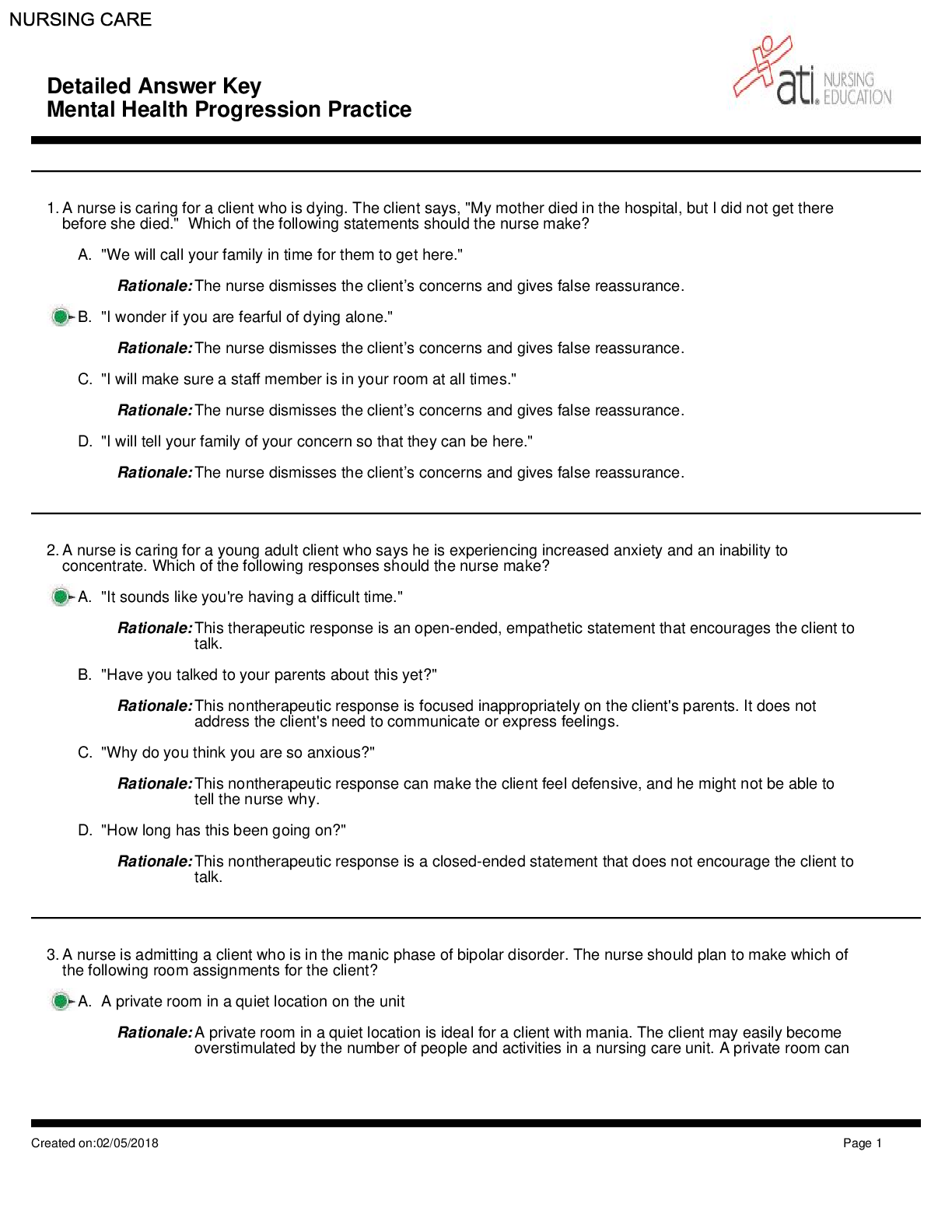
Buy this document to get the full access instantly
Instant Download Access after purchase
Add to cartInstant download
We Accept:

Reviews( 0 )
$10.00
Document information
Connected school, study & course
About the document
Uploaded On
Jul 15, 2022
Number of pages
116
Written in
Additional information
This document has been written for:
Uploaded
Jul 15, 2022
Downloads
0
Views
23

